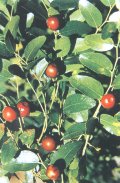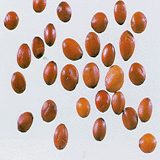Wild Jujuba Seed
http://www.100md.com
《e Natural Health Center》
 |
 |
 |
Tranquilizers
Wild Jujuba Seed
Latin:
Semen Ziziphi Spinosae
Origin:
The ripe seed of Zizyphus jujuba Mill. var. spinosus (Bunge) Hu, one of two species of small, spiny trees of the genus Ziziphus of the family Rhamnaceae. Wild jujuba is native to China, where they have been cultivated for more than 4,000 years. The plant has naturalized in Japan, Korea, Java, Malacca, India, Irag, Turkey, Spain, Nigeria, Haiti, Dominican Republic, etc.
, http://www.100md.com
This species, 7.6 to 9 m high, has alternate, three-veined, elliptical to ovate leaves 2.5 to 7.6 cm long. It is in flower from April to May, and the seeds ripen in October. The flowers are hermaphrodite (have both male and female organs) and are pollinated by insects. The small yellow flowers are followed by dark brown, round to oblong fruits the size of small plums. The white, crisp pulp surrounds a single large, pointed stone. The tree cannot grow in the shade. It requires dry or moist soil and can tolerate drought.
, 百拇医药
The other species, the Indian, or cottony, jujuba (Z. mauritiana) differs from the wild jujube in having leaves that are woolly beneath instead of smooth. The fruits are smaller and not so sweet.
When made into glace fruits by boiling in honey and sugar syrup, they resemble Persian dates and are sometimes known as Chinese dates. Juice obtained from the fruits is used in making small candies called jujubas.
Both species thrive in hot, dry climates where winter temperatures do not go below 9.4° C. The trees are resistant to a great number of pests. Propagation is by seeds, although the commercial varieties must be propagated vegetatively by suckers, root cuttings, or grafting.
, 百拇医药
In China, wild jujuba is mainly produced in the provinces Hebei, Shaanxi, Shanxi, Shandong, etc. When the fruit ripens at the turn of autumn and winter, remove pulp, grind kernels to pieces, take the seeds out and dry them in the sun for use when raw or after parched. Pound them finely for use.
Wild Jujuba is also called Common Jujube, Chinese Jujube or Chinese Date.
Properties:
, 百拇医药 Sweet and sour in flavor, mild in nature, it is related to the heart, liver and gall-bladder channels.
Functions:
Nourishes the heart and liver, tranquilizes the mind and stops excessive sweating.
Wild jujuba is both a delicious fruit and an effective herbal remedy. It aids weight gain, improves muscular strength and increases stamina. In Chinese medicine it is prescribed as a tonic to strengthen liver function.
, 百拇医药
Applications:
1. Treats palpitations and insomnia:
Being sweet in taste and entering the heart and liver channels, this herb can nourish the heart-yin and replenish the blood in the heart and liver to such an extent as to tranquilize the mind. Therefore it is mostly used for such ailments as palpitations, severe palpitations, insomnia, amnesia (loss of memory), etc., due to deficiency of yin and blood and malnutrition of the heart.
, 百拇医药
a) Palpitations and insomnia mainly due to blood deficiency of the heart and liver:
This herb is often used in combination with Chinese angelica, multiflower knotweed tuber (Radix Polygoni Multiflori), longan pulp, etc.
b) Insomnia due to vexation as a result of deficiency of the liver with heat:
This herb is often used in combination with windweed rhizome (Rhizoma Anemarrhenae), tuckahoe (Poria Cocos), chuanxiong (Rhizoma Ligustici Chuanxiong), etc., e.g., Suanzaoren Tang.
, 百拇医药
c) Palpitations and insomnia due to qi deficiency of the heart and spleen:
This herb is often used in combination with Chinese angelica, milk vetch root (Radix Astragali seu Hedysari), dangshen (Radix Codonopsis Pilosulae), etc., e.g., Guipi Tang.
d) Palpitations and insomnia as well as amnesia (loss of memory due usually to brain injury, shock, fatigue, repression, or illness) and dreaminess due to insufficiency of the heart and kidneys and hyperactivity of yang as a result of yin deficiency:
, 百拇医药
This herb can be used in combination with ophiopogon root decoction, raw rehmannia, thinleaf milkwort root (Radix Polygalae), e.g., Tianwang Buxin Wan.
2. Treats hyperhidrosis (excessive perspiration) due to general weakness, spontaneous perspiration and night sweat:
Being sour in taste, this herb can astringe to arrest sweating.
This herb is always used together with Chinese magnoliavine fruit (fructus Schisandrae), medicinal cornel fruit (Fructus Corni), milk vetch root (Radix Astragali seu Hedysari), etc.
, 百拇医药
Dosage and Administration:
10-18 g.
Decoct this herb for oral administration or grind it into powder for swallowing.
Cautions on Use:
Reference Materials:
'Shen Nong's Herbal Classic' :
"Chills and fever in the chest and abdomen, accumulation of pathogenic factors and stagnation of qi and damp arthralgia with soreness and pain in the limbs."
, 百拇医药
'Other Medical Records of Famous Physicians' :
"Insomnia due to vexation, sweating due to debility and excessive thirst. Nourishing the spleen and stomach, replenishing the liver-qi, reinforcing bones and muscles and assisting yin and qi."
'Guide to Reading of Materia Medica' :
"Being sweet and moistening, the wild jujuba seed is used after prepared for the treatment of such ailments as insomnia due to deficiency of the gall-bladder, excessive thirst and sweating due to debility. It is used when raw for the treatment of drowsiness due to the gall-bladder-heat. It is an herb for the foot jueyin and shaoyang channels."
, 百拇医药
Toxic or Side Effects:
Modern Researches:
This herb contains large amounts of fatty oil and proteins, two kinds of sterols, two kinds of triterpenoid compounds (betulin and betulic acid), jujuboside, etc., and it also contains a large amount of vitamin C.
The decoction of the wild jujuba seed has tranquilizing and hypnotic effects. It can antagonize the state of stimulation caused by caffeine. It can enable the obvious reduction of the frequency of protective motion conditional reflex, the diffusion of internal inhibition and subsidence of conditional reflex.
, 百拇医药
The decoction also has tranquilizing, anticonvulsive and temperature-lowering effects. The water-soluble ingredients of the wild jujuba seed may cause the continuous reduction of blood pressure and heart block. They can also stimulate the uterus.
Japanese research has shown that wild jujuba increases immune-system resistence. In one clinical trial in China 12 patients with liver complaints were given wild jujuba, peanuts and brown sugar nightly. In four weeks their liver function had improved.
, 百拇医药
The dried fruits of wild jujuba are anodyne, anticancer, pectoral, refrigerant, sedative, stomachic, styptic and tonic. They are considered to purify the blood and aid digestion. They are used internally in the treatment of chronic fatigue, loss of appetite, diarrhoea, anaemia, irritability and hysteria.
The seed is hypnotic, narcotic, sedative, stomachic and tonic. It is used internally in the treatment of palpitations, insomnia, nervous exhaustion, night sweats and excessive perspiration.
, http://www.100md.com
The leaves are astringent and febrifuge. They are said to promote the growth of hair. They are used to form a plaster in the treatment of strangury.
The root is used in the treatment of dyspepsia. A decoction of the root has been used in the treatment of fever. The root is made into a powder and applied to old wounds and ulcers.
The plant is a folk remedy for anaemia, hypertonia, nephritis and nervous diseases.
The plant is widely used in China as a treatment for burns., 百拇医药